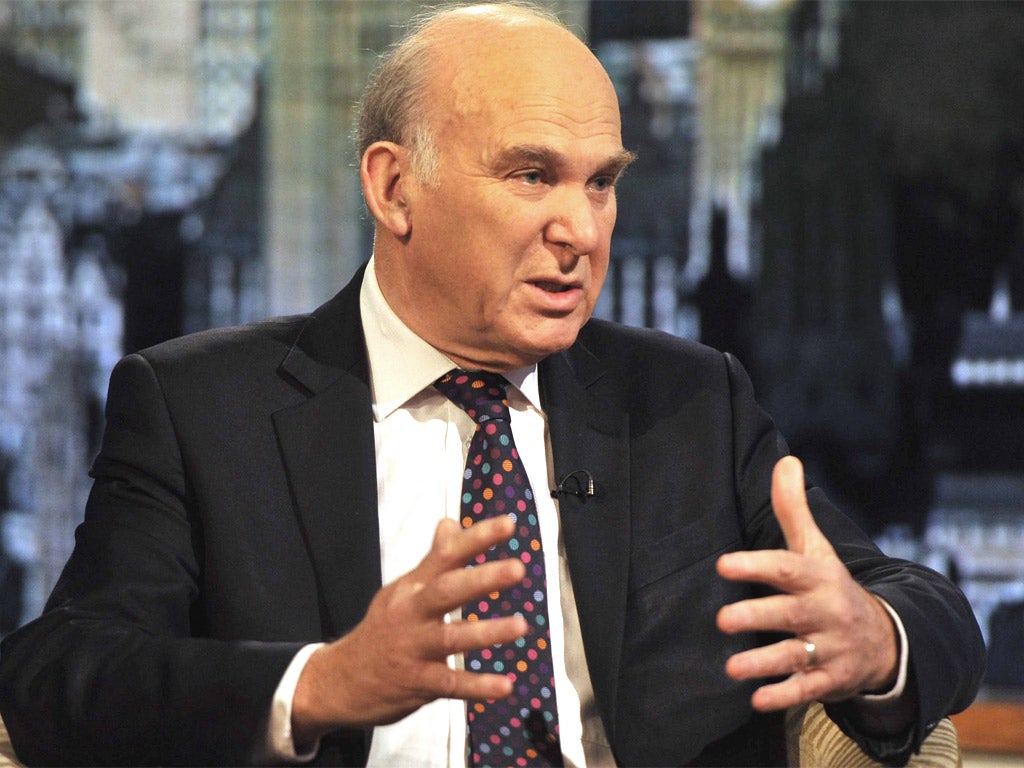Cable and Osborne on a collision course over small-business bank

Your support helps us to tell the story
From reproductive rights to climate change to Big Tech, The Independent is on the ground when the story is developing. Whether it's investigating the financials of Elon Musk's pro-Trump PAC or producing our latest documentary, 'The A Word', which shines a light on the American women fighting for reproductive rights, we know how important it is to parse out the facts from the messaging.
At such a critical moment in US history, we need reporters on the ground. Your donation allows us to keep sending journalists to speak to both sides of the story.
The Independent is trusted by Americans across the entire political spectrum. And unlike many other quality news outlets, we choose not to lock Americans out of our reporting and analysis with paywalls. We believe quality journalism should be available to everyone, paid for by those who can afford it.
Your support makes all the difference.A row between Vince Cable and George Osborne was brewing last night over whether a new Government-backed bank should lend money directly to cash-starved small businesses.
The Liberal Democrat Business Secretary said yesterday that the scheme "may well" involve state lending. But when the Chancellor announced the "small-business bank" last week, the Treasury made clear it would not have a budget to channel money to firms and would merely make existing government schemes to help business more accessible.
The latest exchange between Mr Osborne and Mr Cable echoes a previous dispute over Liberal Democrat demands for the Government to fully nationalise the Royal Bank of Scotland to force it to boost lending to firms. The plan was blocked by the Chancellor, who wants to sell the state's 82-per-cent stake in the bank when the time is right.Mr Cable, who outlined a new pro-active government industrial strategy yesterday, has criticised the banks for not lending to business and is determined to see the state-sponsored bank have real teeth. "There is a battle going on about this," one Whitehall insider said yesterday.
The Business Secretary conceded that he is still discussing the new bank's "scale and scope" with the Chancellor. He insisted: "Government can make a difference. There are areas where the lending market doesn't work well and we think the Government has a role, as a catalyst, in those areas."
Mr Cable added: "There are a lot of companies – gazelles, the rapid growth success stories – which need what they call 'patient capital'. They need 20-year money, they find it very difficult to get this from the banking sector. They can get a bit of equity now through the business growth fund, but they can't get long-term loan capital.
"So there is a role for an institution that can promote that kind of lending. But I'm working at the moment with the Chancellor, on how big this should be, how it should operate, and what the sectors that it services should be."
In a speech in London, Mr Cable said the business bank could operate through one of the new smaller "challenger banks" such as Sweden's Handelsbanken, the Co-Op and Aldermore. Insisting the Government would not "pick winners" as in the 60s and 70s, Mr Cable wants to put its muscle behind high-growth sectors that need a long-term partnership – such as advanced manufacturing, the digital economy, green energy firms and higher education.
The Business Secretary said Britain could learn from Germany how to procure from domestic companies while not breaking EU single market rules, and conceded the UK had been a "bit too defensive about the EU".
He said the Government would, for example, try to ensure that as many sub-contracts went to British firms when train orders were placed.
Mr Cable's long-standing plea for a more radical industrial strategy was backed by the Cabinet yesterday. Conservative and Liberal Democrat ministers agreed that all governments, as major purchasers of goods and services, had an industrial policy – even if by default, and so it was better to have an organised, pro-active one.
John Cridland, director-general of the Confederation of British Industry, described the new strategy as a "valuable first step". While the CBI did not believe a state bank lending directly was necessary, he said there was a critical need to provide new alternatives to traditional bank financing.
Subscribe to Independent Premium to bookmark this article
Want to bookmark your favourite articles and stories to read or reference later? Start your Independent Premium subscription today.
Join our commenting forum
Join thought-provoking conversations, follow other Independent readers and see their replies
Comments